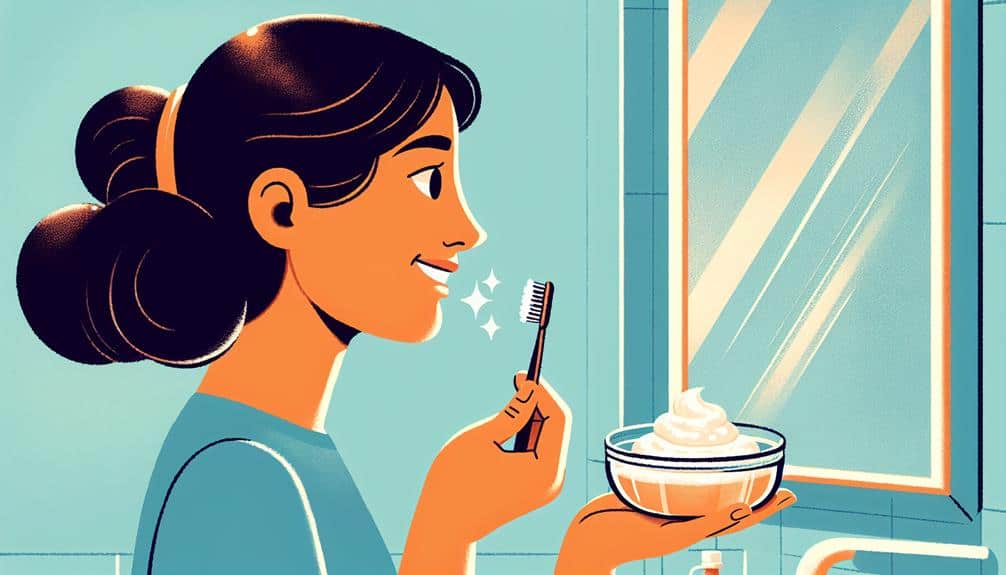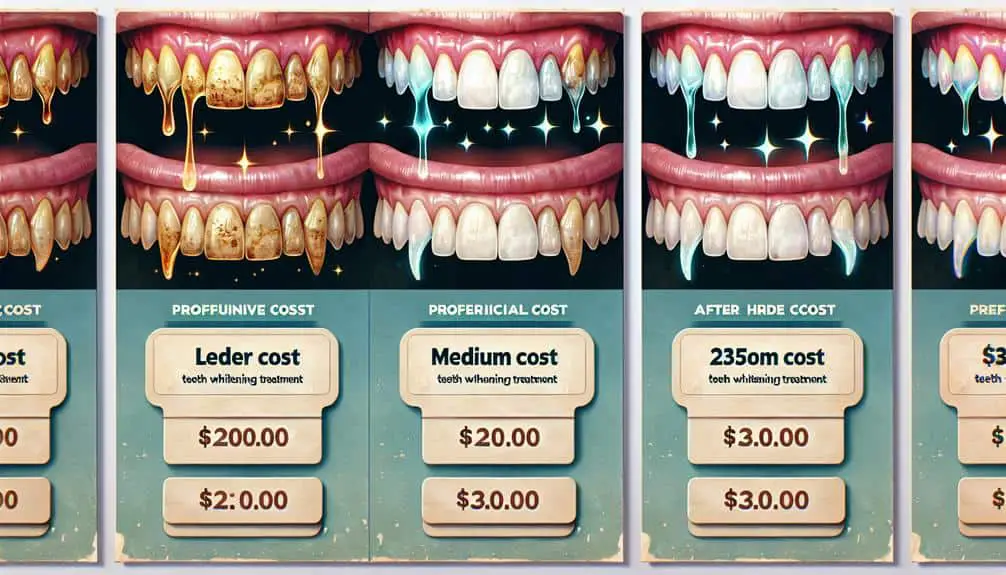Opt for DIY teeth whitening methods for a cost-effective, immediate solution using natural ingredients like baking soda and hydrogen peroxide. These methods offer health benefits and use safe ingredients like activated charcoal and herbal remedies. Enjoy a gentle approach that won't compromise oral health with non-toxic options such as oil pulling with coconut oil or a mixture of strawberries and baking soda. The convenience of at-home whitening kits or easy-to-use whitening strips fits perfectly into your daily routine, offering a practical choice for achieving a brighter smile. Uncover more benefits of these DIY techniques for a confident smile.
Key Points
- Cost-effective solution: Save money with natural remedies like baking soda and hydrogen peroxide.
- Convenient method: Easy application at home with whitening kits or simple ingredients.
- Immediate results: See a difference quickly without scheduling appointments or visits.
- Health benefits: Natural ingredients promote oral health while whitening teeth.
- Natural and safe ingredients: Avoid harsh chemicals and opt for gentle, eco-friendly alternatives.
Benefits of DIY Teeth Whitening
When you choose to whiten your teeth at home using DIY methods, you can enjoy cost-effective and convenient solutions to enhance your smile. One of the significant benefits of DIY teeth whitening is the immediate results it offers. Unlike professional treatments that may take multiple sessions to see a noticeable difference, some DIY methods can provide visible whitening effects after just one use. This quick turnaround can be particularly advantageous if you have an upcoming event or simply want to boost your confidence without delay.
In addition to the immediate results, there are also health benefits associated with DIY teeth whitening. Many natural and safe ingredients can be used in at-home whitening remedies, reducing the exposure to harsh chemicals often found in commercial whitening products. For example, baking soda, activated charcoal, and hydrogen peroxide are commonly used ingredients that can effectively whiten teeth without causing harm to the enamel or gums. By opting for these gentler alternatives, you can protect your oral health while achieving a brighter smile.
Natural Ingredients for Whiter Teeth
Natural ingredients like baking soda, activated charcoal, and hydrogen peroxide are effective options for achieving whiter teeth without exposing your enamel or gums to harsh chemicals. Herbal remedies such as sage, neem, and peppermint oil also play a role in natural teeth whitening. These ingredients contain antibacterial properties that help combat plaque and stains on the teeth, promoting a brighter smile.
DIY recipes incorporating these natural ingredients can be easily prepared at home. A popular recipe involves mixing baking soda with a few drops of hydrogen peroxide to form a paste. Gently brushing your teeth with this paste for a couple of minutes can help remove surface stains. Activated charcoal, when mixed with water to form a paste, can also help whiten teeth by adsorbing plaque and other compounds that cause discoloration.
Incorporating these natural ingredients into your oral care routine can be a safe and effective way to achieve whiter teeth without the use of harsh chemicals.
Cost-Effective Teeth Whitening Solutions
To explore cost-effective teeth whitening solutions, contemplate practical methods that are budget-friendly and still deliver effective results.
When looking for budget-friendly options, you might want to experiment with natural remedies like baking soda and hydrogen peroxide, which are known for their teeth whitening properties and are often found in many households. These ingredients can be mixed to form a paste that can help remove stains and brighten your smile without breaking the bank.
Another eco-friendly alternative to ponder is activated charcoal. This black powder may seem counterintuitive, but it has been shown to effectively remove surface stains from teeth, leaving them looking whiter. Activated charcoal is affordable and can be a sustainable option for those looking to avoid harsh chemicals found in some commercial whitening products.
Safe and Gentle DIY Whitening Methods
For a safe and gentle approach to teeth whitening at home, consider utilizing proven DIY methods that prioritize oral health. When dealing with sensitive teeth, it's essential to opt for non-toxic options to prevent any discomfort or damage.
One effective method is using baking soda and hydrogen peroxide. Baking soda has mild abrasive properties that can help remove surface stains without eroding the enamel, while hydrogen peroxide acts as a bleaching agent to whiten teeth gently.
Another gentle DIY option is oil pulling with coconut oil. This ancient practice involves swishing coconut oil in your mouth to reduce bacteria and plaque, which can contribute to a brighter smile.
Additionally, strawberries mashed with baking soda create a natural and safe whitening paste due to the fruit's malic acid content, which can help break down stains. These methods offer a safe and gentle way to whiten your teeth at home without compromising your oral health or exacerbating sensitivity.
Convenience of At-Home Teeth Whitening
Discover the convenient options available for whitening your teeth at home to achieve a brighter smile effortlessly. At-home teeth whitening kits are a time-saving option for individuals looking to enhance their smile without the hassle of scheduling appointments at a dental office. These kits typically come with easy application methods, such as whitening strips or trays that can be worn during daily activities. The convenience of at-home teeth whitening allows you to multitask while brightening your teeth, making it a practical choice for busy individuals.
With the easy application process of at-home teeth whitening kits, you can whiten your teeth at your own pace and in the comfort of your home. These kits are designed to be user-friendly, providing step-by-step instructions for best results. By choosing at-home teeth whitening, you have the flexibility to incorporate teeth whitening into your daily routine without disrupting your schedule. Embrace the simplicity and effectiveness of at-home teeth whitening for a radiant smile.
Frequently Asked Questions
Are There Any Risks or Potential Side Effects Associated With DIY Teeth Whitening Methods?
When it comes to DIY teeth whitening methods, it's important to be aware of potential risks and side effects. Taking precautions, following safety guidelines, and understanding effectiveness are key to achieving a brighter smile without compromising your oral health.
How Long Can I Expect the Results of DIY Teeth Whitening to Last?
For long-lasting results from DIY teeth whitening, prioritize maintaining good oral hygiene. Schedule professional consultations for touch-ups and advice on long-term maintenance. Consistent care and occasional touch-ups can help extend the effects of your whitening efforts.
Can DIY Teeth Whitening Methods Cause Sensitivity or Damage to My Teeth and Gums?
Potential risks of DIY teeth whitening methods include increased sensitivity and potential damage to your teeth and gums. A statistic shows that 41% of individuals experience tooth sensitivity after using these methods. Protect your oral health by being cautious.
Are There Any Specific Dietary or Lifestyle Changes I Should Make to Enhance the Efficacy of DIY Teeth Whitening?
To enhance DIY teeth whitening efficacy, consider dietary adjustments like reducing staining foods and beverages. Lifestyle modifications such as quitting smoking can also help. Maintain proper oral hygiene practices and try natural remedies like baking soda or activated charcoal.
Are DIY Teeth Whitening Methods Suitable for Individuals With Dental Conditions or Dental Restorations Like Crowns or Veneers?
For individuals with dental conditions or restorations like crowns or veneers, consult dental professionals before DIY teeth whitening. Restorative dentistry may impact the efficacy and safety of such methods. Prioritize professional advice to maintain oral health.



